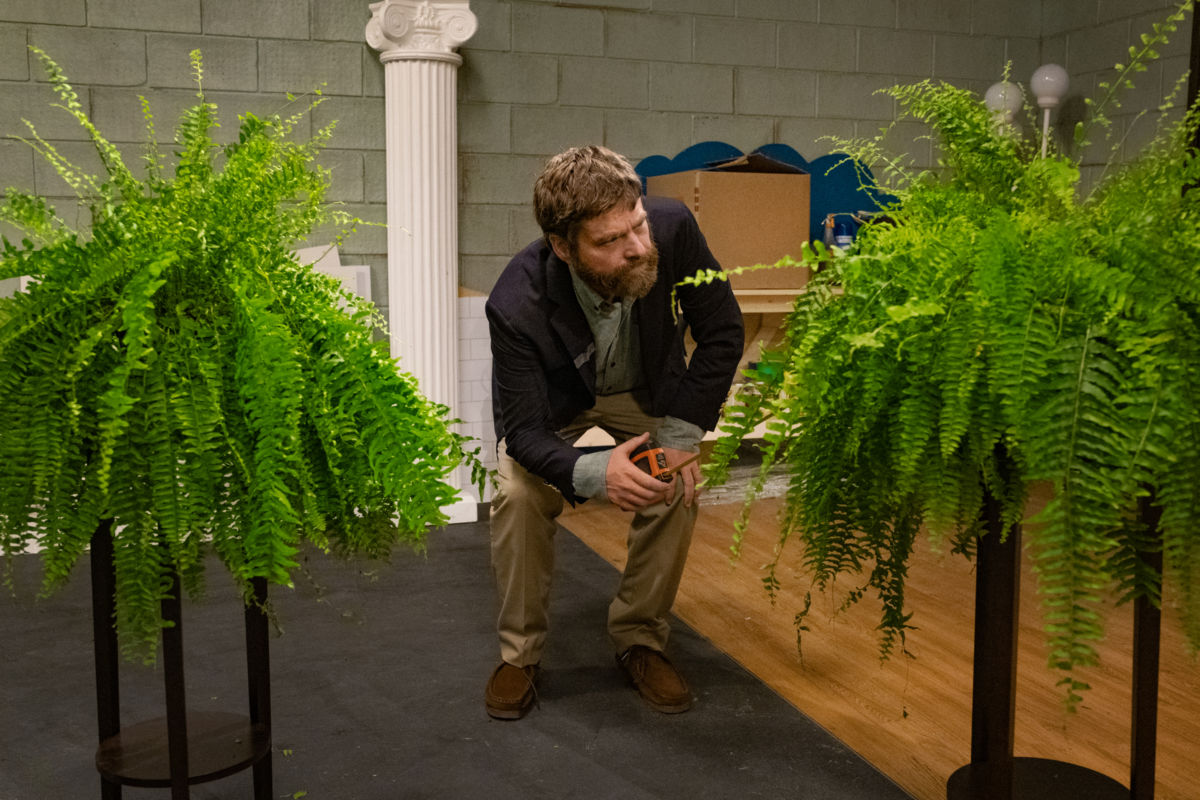I have watched plenty of web episodes of Between Two Ferns (the format the movie is based on) over the years. Instead of the format of regular talk shows, where the host panders to the celebrity and there is a riveted audience ready to cheer and clap, Between Two Ferns does the inverse. The host Zach Galifianakis spends the bulk of the episode insulting the celebrity, with a set that is dark and dreary and the presence of two ferns that frankly don’t do much to add colour and vibrancy. It is all intentional and done to capture the vibe of a low budget out-of-one’s-garage kind of production value.
The movie is very much the same format, just longer and built around a road trip narrative, with celebrity interviews stacked in between. I thought a movie format would give us more awkward celebrity interactions with Galifianakis, but instead, because of the road trip narrative encompassing the bulk of the movie, the celebrity interviews are bite-size and don’t really leave a lasting impact. Keanu Reeves and Brie Larson’s interviews are barely a minute, and neither one really made an impression. Comparing this to Keanu Reeves’ appearance in Always Be My Maybe, where he parodies himself, and there isn’t even an ounce of that goodness.
What we get instead is awkward flirting between Galifianakis and Chrissy Teigen. Yes, I get that we are meant to gasp in incredulity of how a woman like Chrissy Teigen would even desire Galifianakis, yet I was cringing more than laughing. Don’t get me started on John Legend’s horrible acting appearance. The man may have an EGOT, but none of those awards are for acting.
These sequences of events also seem very staged and unnatural. The show is scripted on Galifianakis’ end, however, the actors are able to respond accordingly, at times improvising when necessary. This didn’t happen here since Teigen and Legend know what is expected of them, which ruins the authenticity the format of the show is built on.
The better interviews are the ones with comedians, since they are willing to spar with Galifianakis, so it comes across as more engaging. Paul Rudd, for this reason, enjoys the best interview of the lot. It is probably the longest one as well, which is why it is more impactful. Rudd’s has impeccable comedic timing, balancing Galifianakis’ deadpan insults with some witty repartees of his own. He also looks like he is having difficulties in suppressing his laughter, which incites laughter from us as we watch him attempt to maintain a straight face.
Peter Dinklage’s segment, while not entirely an interview like Rudd’s, is also entertaining enough due to the persona Dinklage has taken on. Compared to the Chrissy Teigen and John Legend segment, this is infinitely funnier and comes across more authentically, maybe because Dinklage really sells this Midas-like character he is supposed to be.
The road trip doesn’t accomplish much in terms of cinematography or character work, which is a shame when we know what Galifianakis is capable of from The Hangover movies – well, maybe just the first one. Galifianakis only has chemistry with Lauren Lapkus, who plays his assistant Carol. She has such wide-eyed optimism and belief in him, and Lapkus sells it very well. The rest of his crew are present, but they don’t really add much to the picture, besides complaining about Galifianakis and moaning about his stupidity. By the time we reach the third act, it is clear that this is a film trying to drag itself out when there is no narrative left to spin.
There are quite a few celebrity cameos, but they are too brief to do anything exciting. Adam Scott’s cameo and a Parks and Recreation joke produced a chuckle from me, though I think this is mainly because of Scott’s reaction to the clueless comment from Galifianakis. Will Ferrell offers some laughs as well, as the coke-head nefarious show producer who wants more episodes of the show so he can make money to sustain his drug habit. Ferrell does such a bad job at masquerading this evil persona that we can’t help but laugh at his supposed villainy.
One of the themes the movie is built on is dream chasing. Galifianakis is doing Ferrell’s bidding because he wants to have his own talk show on a television network. But the movie seems to be saying that in the pursuit of your dreams, you end up selling out to become what you think you should be. This is definitely a reflection of Hollywood, where there is an element of homogeneity to everything.
The irony here is, by taking the show’s format to Netflix and making into a film, isn’t Between Two Ferns, in a way, selling out as well? The film is definitely more gimmicky and appeals more to a mainstream kind of humour. There is even a bloopers section at the end of the movie, and while it’ss very funny, it once again takes away from the natural format the show runs on. It shows us how curated everything is, which just bursts the bubble of this abrasive host getting a sincere reaction out of his celebrity interviewees.
Netflix is the perfect platform for this movie since it is a film you can watch with a group of friends for a laugh. Don’t expect a cerebral quality of humour that is present in some of the Netflix comedy specials, though. The movie, sadly, becomes a parody of itself, ending up as a generic comedy that doesn’t amount to much.
Some of the coverage you find on Cultured Vultures contains affiliate links, which provide us with small commissions based on purchases made from visiting our site.


